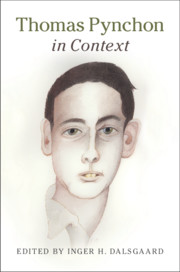Book contents
- Thomas Pynchon in Context
- Thomas Pynchon in Context
- Copyright page
- Contents
- Contributors
- Abbreviations
- Chronology
- Introduction
- Part I Times and Places
- Part II Culture, Politics, and Society
- Part III Approaches and Readings
- Chapter 34 Narratology
- Chapter 35 Genre
- Chapter 36 Postmodernism
- Chapter 37 Ambiguity
- Chapter 38 Realities
- Chapter 39 Material Readings
- Chapter 40 Digital Readings
- Chapter 41 Internet Resources
- Chapter 42 Fandom
- Chapter 43 Book Reviews and Reception
- Chapter 44 Critical Literature Review
- Further Reading
- Index
Chapter 38 - Realities
from Part III - Approaches and Readings
Published online by Cambridge University Press: 31 May 2019
- Thomas Pynchon in Context
- Thomas Pynchon in Context
- Copyright page
- Contents
- Contributors
- Abbreviations
- Chronology
- Introduction
- Part I Times and Places
- Part II Culture, Politics, and Society
- Part III Approaches and Readings
- Chapter 34 Narratology
- Chapter 35 Genre
- Chapter 36 Postmodernism
- Chapter 37 Ambiguity
- Chapter 38 Realities
- Chapter 39 Material Readings
- Chapter 40 Digital Readings
- Chapter 41 Internet Resources
- Chapter 42 Fandom
- Chapter 43 Book Reviews and Reception
- Chapter 44 Critical Literature Review
- Further Reading
- Index
Summary
As readers approaching a Thomas Pynchon novel for the first time, we have to face his determination to undermine our sense of reality, or destabilize our ontology, as theorists put it. No author can have much hope of our dropping the assumptions we live by simply on a novel’s say-so, but by constantly shoving a variety of alternative types of reality at us, Pynchon irritates and confuses us, but also intrigues us and makes us perhaps a bit less confident of our world picture. We may fear some of his options, but may come to desire some as well. Sometimes Pynchon’s alternative realities superimpose themselves on material existence; other times, they are reached by passing some barrier or going through some portal. Whereas most speculative fiction would treat such portal-transitions with excitement and awareness of the new possibilities, Pynchon’s alternative realities usually cause little excitement and tend to be accepted as just the way things are.
- Type
- Chapter
- Information
- Thomas Pynchon in Context , pp. 307 - 314Publisher: Cambridge University PressPrint publication year: 2019

